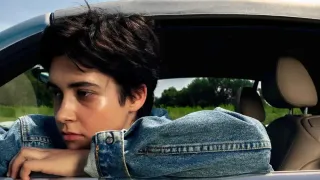June 3, 2024
New Book Looks at How 'Mommie Dearest' Became a Camp Classic
Kilian Melloy READ TIME: 7 MIN.
EDGE: You must have gone to the ends of the earth to talk to everybody that you interviewed to for this book. What went into finding these people and approaching them?
A. Ashley Hoff: I was very, very lucky in being able to reach all the people that I did – production staff members, crew members, and some of the actors in smaller, and sometimes uncredited, roles. There were a few people that were reticent to discuss the subject, but at the same time there were other people who were perfectly fine with it. I think the controversy surrounding the film is still potent four decades on, which is pretty interesting.
EDGE: The book observes that no one saw how campy this movie was when they were making it, except for one gay editor who didn't even see any footage.
A. Ashley Hoff: It's like the old saying, "Can't see the forest for the trees." The Franks – producer Frank Yablans and director Frank Perry – really thought that what they had was this great story that was almost a Greek tragedy. They set out to make this dramatic story; they knew the footage that should have been in the film, except the runtime ended up over three hours and so entire scenes and sequences had to be cut. So, the story they were telling they had inside their heads, but what made it on screen was incomplete from what their greater picture was supposed to be.
EDGE: Crawford's depiction in terms of costuming and makeup, as well as Dunaway's embodiment of her, comes across as a kind of wild, yet specific, exaggeration – which is the essence of camp, but also reminds me of drag.
A. Ashley Hoff: Well, that's true. The gay community embraced this movie from the get-go, partly because Joan Crawford was always considered kind of a "gay icon." She represented real Hollywood glamour, and the styles of the '40s and '50s, even into the '60s, were very glamorous: Outré clothes, outré styles. That element certainly contributes to the camp factor.
I've been asked why the gay community embraced this movie. For one thing, it is a story about child abuse. A lot of gay men and women have experienced bullying or abuse, so they identify with Christina – but I think a lot of gays also recognize that Joan Crawford, according to her biographers, was abused. Unfortunately, we see a lot of times the abused grow up to become abusers themselves, because they were never taught how to deal with their own inner turmoil and traumas. I think a lot of audience members identify with either Christina or Joan, and sometimes watching "Mommie Dearest" becomes a cathartic experience.
EDGE: Christina Crawford said that what she wanted to create, and what she wanted the movie to be, was "a tragic love story between a mother and a daughter." That sounds more like someone grieving than someone looking for revenge.
A. Ashley Hoff: I'd say that's a pretty accurate assessment. For those people who do assume that Christina Crawford wrote the book out of revenge, I would have to ask, "Revenge for what?" I don't think she necessarily did write the book out of revenge. I wasn't there; I can't speak to that. I will say that many years ago, before I set out to write this book, I had met Christina Crawford and we ended up in conversation about the movie. While she really doesn't like the movie, she acknowledged that its popularity helped bring discussions of both child abuse and how to overcome it into the mainstream conversation. Whatever her motives for writing the book, it really has done a lot of good. Laws have been put in place protecting children, as well as parents [now] being [more] conscious of how they're raising children.
EDGE: The casting of Faye Dunaway to play Joan Crawford seems too perfect – more so as time goes on, and we keep seeing headlines about Dunaway's erratic behavior.
A. Ashley Hoff: Faye Dunaway is an amazing actress with an amazing resume. She starred in no less than three motion pictures that are on the top of every list of top 100 motion pictures of the last century. "Bonnie and Clyde," "Chinatown," and "Network" were three amazing movies that cemented her status as an A-list movie star. "Mommy Dearest" has stuck out because it was a unique performance, and because the film has become this legendary "flop," despite the fact that it was never a commercial failure.
Faye Dunaway has many of the qualities that made Joan Crawford a star: She's got a bold personality. She's a formidable figure both on and off stage. Whatever your opinion of Faye Dunaway's behavior on set, or off set, or on the screen, she is one of a kind, and so was Joan Crawford. I think that's one of the things that attracted Faye to the project. She saw a lot of herself in Joan Crawford, and she obviously grew up watching Joan Crawford movies, and kind of identifying with that all-American grit that made Crawford's reputation what it was.
EDGE: Maybe that's why in the public mind the two tend to get fused so much.
A. Ashley Hoff: They do, and it's very interesting. There have been a number of occasions when there have been articles about Joan Crawford and her legacy, and the newspapers have mistakenly included a photograph of Faye Dunaway as Joan Crawford from "Mommie Dearest" by mistake. I think it's no coincidence.
"Love, Mommie Dearest" is available now from Chicago Review Press.






